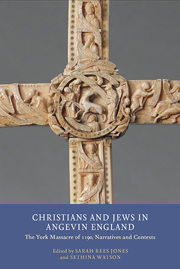Book contents
- Frontmatter
- Contents
- List of Illustrations
- Contributors
- Editor's Preface and Acknowledgments
- Abbreviations
- Introduction: The Moment and Memory of the York Massacre of 1190
- Part I The Events of March 1190
- Part II Jews among Christians in Medieval England
- Part III Representations
- 12 Egyptian Days: From Passion to Exodus in the Representation of Twelfth-Century Jewish-Christian Relations
- 13 ‘De Judaea, muta et surda’: Jewish Conversion in Gerald of Wales's Life of Saint Remigius
- 14 Dehumanizing the Jew at the Funeral of the Virgin Mary in the Thirteenth Century (c. 1170–c. 1350)
- 15 Massacre and Memory: Ethics and Method in Recent Scholarship on Jewish Martyrdom
- 16 The Future of the Jews of York
- Afterword: Violence, Memory and the Traumatic Middle Ages
- Bibliography
- Index
- York Medieval Press: Publications
12 - Egyptian Days: From Passion to Exodus in the Representation of Twelfth-Century Jewish-Christian Relations
from Part III - Representations
Published online by Cambridge University Press: 05 May 2013
- Frontmatter
- Contents
- List of Illustrations
- Contributors
- Editor's Preface and Acknowledgments
- Abbreviations
- Introduction: The Moment and Memory of the York Massacre of 1190
- Part I The Events of March 1190
- Part II Jews among Christians in Medieval England
- Part III Representations
- 12 Egyptian Days: From Passion to Exodus in the Representation of Twelfth-Century Jewish-Christian Relations
- 13 ‘De Judaea, muta et surda’: Jewish Conversion in Gerald of Wales's Life of Saint Remigius
- 14 Dehumanizing the Jew at the Funeral of the Virgin Mary in the Thirteenth Century (c. 1170–c. 1350)
- 15 Massacre and Memory: Ethics and Method in Recent Scholarship on Jewish Martyrdom
- 16 The Future of the Jews of York
- Afterword: Violence, Memory and the Traumatic Middle Ages
- Bibliography
- Index
- York Medieval Press: Publications
Summary
Richard … was consecrated king … on the third day of the nones of September, a day which, from the ancient superstition of the Gentiles, is called Evil, or Egyptian, as if it had been a kind of presage of the event which occurred to the Jews, and to be Egyptian rather than English; since England, in which their fathers had been happy and respected under the preceding king, was suddenly changed against them, by the judgment of God, into a kind of Egypt where their fathers had suffered hard things…
The worst ‘Egyptian day’ suffered by the Jews of twelfth-century England was undoubtedly the massacre at York in 1190 – an event that stunned contemporary onlookers, Jews and Christians alike. Of contemporary chroniclers who discuss the violence at York, William of Newburgh provides the most elaborated detail. He identifies the Egyptian day of Richard's coronation as something new for the Jews: events, he writes, were ‘suddenly changed against them’. Other chroniclers of the persecutions of the Jews that followed the coronation of Richard the Lionheart in 1189 likewise noted that they were novel: Ralph de Diceto, an eyewitness and participant in the coronation ceremony of Richard I, writes, ‘the peace of the Jews, which they had always maintained since antiquity, had been severed by foreigners’. And indeed, whereas Jews living on the continent had suffered at the hands of violent mobs particularly during the First Crusade, the Jews of England had survived safely through two crusades. Moreover, from the mid-twelfth century, the most troublesome discourse concerning the Jews of England did not involve violence against Jews, but rather against Christians.
- Type
- Chapter
- Information
- Christians and Jews in Angevin EnglandThe York Massacre of 1190, Narratives and Contexts, pp. 222 - 237Publisher: Boydell & BrewerPrint publication year: 2013



